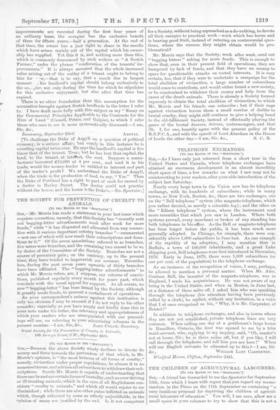TELEPHONE EXCHANGES.
(TO THE EDITOR OF THR BEICOTRTOR."]
Sln,—As I have only just returned from a short tour in the United States and Canada, where telephone exchanges have attained an enormous development in an almost incredibly short space of time, a few remarks on what I saw may not be uninteresting to your readers, after your able introduction of the subject last Saturday.
Nearly every large town in the Union now has its telephone exchange, with its hundreds of subscribers ; while in many towns, as New York, Boston, &c., there are two exchanges, one on the "Bell telephone" system (the magneto-telephone, which you rather decried, as merely a scientific toy) ; and the other on the "Edison telephone" system, where the instrument used more resembles that which you saw in London. Where both systems prevail, every merchant or broker of any standing has both telephones in his office. As the Bell or magneto-telephone has been longer before the public, it has been much more generally adopted. In Chicago, for example, there were con- siderably above 1,000 subscribers in June last. As one example of the rapidity of its adoption, I may mention that in Buffalo, a town of 100,000 inhabitants, and a great Lake shipping port, Bell telephones were first introduced in December, 1878. Early in June, 1879, there were 1,000 subscribers (or one per cent, of the population.) to the telephone exchange.
As an instance of the recognition of voices, I may, perhaps, be allowed to mention a personal matter. When Mr. Alex. Graham Bell, the inventor of the magneto-telephone, was in England, I made his acquaintance. He was not aware of my being in the United States, and when in Boston, in June last, at a distance of three miles off, I asked him who was speaking through the telephone (his attention having been previously called by a clerk), he replied, without any hesitation, in a voice that I at once recognised as his, "Why, it is Mr. Carpenter, of Bristol !"
In addition to telephone exchanges, and also in towns where private telephone lines are very they are not yet established, common. When calling one day at a gentleman's large house in Hamilton, Ontario, the door was opened to me by a trim maid-servant, who, replying to my inquiry, said, "Oh, master's not at home, Sir ; he is three miles off, but if you like, I will call through the telephone, and tell him you are here !" When will our English servants be educated up to this P-1 am, Sir
WILLIAM LANT CARPENTER.
Winifred House, Clifton, September 24th.


































 Previous page
Previous page